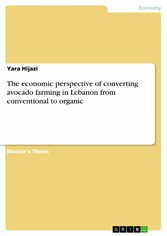Suchen und Finden

The economic perspective of converting avocado farming in Lebanon from conventional to organic
Mehr zum Inhalt

The economic perspective of converting avocado farming in Lebanon from conventional to organic
Master's Thesis from the year 2021 in the subject Economy - Environment economics, grade: 1,8, University of Koblenz-Landau (Faculty of Natural Sciences), language: English, abstract: The goal of this paper is to find out whether converting from conventional to organic farming of some avocado farmers would improve the economic situation of the farmers in Lebanon. It also aims to look deeper into the motivation of conversion, obstacles in the way, and to consider alternatives. Lebanon is one of the small countries in the Middle East where agriculture plays a huge role in supporting its economy. The United Nations stated that, in total, 6,8 million people reside in Lebanon where the agriculture sector contributes to 2.5% of the Gross Domestic Product (GDP) and offers jobs to more than 11% of the population. Due to a Mediterranean climate and a fair amount of rain, the Lebanese agricultural practice varies along the mountains and coast. With the suitable climate, fertile soil, a high amount of rainfall, and water availability for irrigation, more than 2000 different wild species of plants can grow. This allows for different types of crops as well, including field crops, olives, fruits, vegetables, and many more. This diversity enables not only the benefit to the locals but also the exporting of the harvest to the Arab countries and Europe. In the past, farmers were dependent on certain fruits, mainly citrus (for example lemon, orange, mandarin). These were planted on a 210-km-area along the coast. However, these fruits have suffered during the past decade as a result of socio-political-economic reasons, failing to provide economic support for the local farmers. Nevertheless, farmers showed a potential to shift agricultural practices towards other fruits. The avocado tree showed to be a prominent candidate and its role in agriculture has had a huge development with the help of projects by foreign nations such as the United States (US), The Netherlands, and France. This supported the agriculture sector through the funding of projects and by providing experts to help farmers increase their production to a higher level. Today, avocado farming belongs not only to the important fields of Lebanese agriculture but also in the Arab and European markets the sale of Lebanese avocados has been prominent. The international market for avocados is highly competitive, and research shows that markets such as Europe prefer better quality and more sustainable organic fruits. However, the economy in Lebanon has seen a drastic decline since October 2019 and farmers need a sustainable plan to keep their work going.
Alle Preise verstehen sich inklusive der gesetzlichen MwSt.





